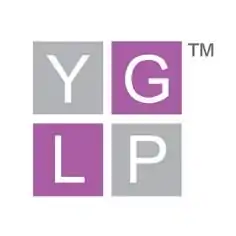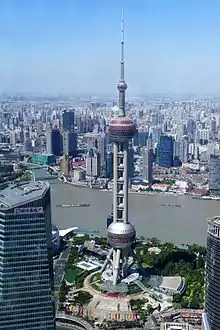YGLP
YGLP (Young Global Leadership Program) is an international leadership program for university and high school students.
.jpg.webp)
 | |
| Founded | 2016 |
|---|---|
| Type | International Leadership Program for University and High School students |
| Focus | Leadership Development |
| Headquarters | London, United Kingdom |
| Origins | HSL Leadership, Human Cognition & Critical Thinking project |
Area served | worldwide |
| Method | YGLP Fellow Program |
| Fields | Education |
Official language | English |
Parent organization | Human Science Lab [1] |
| Website | www.yglpasia.org |
It is founded and developed by Human Science Lab, London, with support from several foundations and transnational organisations. It uses outcomes from some of its core research on human cognition, leadership and critical thinking.[2]
YGLP is run in five regional groupings – Asia, Americas, Europe, Africa and the Oceania. The assignment of countries or territories to YGLP regional groupings is done in accordance with United Nations geoscheme.[3]
Scientific Framework
Various research programs on human cognition, leadership, critical thinking, physical spatiality and intelligence at Human Science Lab, London, provides the scientific framework for YGLP.
YGLP is based on the Four Step Leadership Theory formulated at Human Science Lab. According to the theory “the leadership achievement of an individual is proportional to the optimal use of four principal components that makes a leader – motivation, planning, energising and executing”. YGLP is designed to optimise this four key leadership component with each program module focusing on a single component.[4][5]
YGLP Fellow Program
YGLP is executed through two fellow programs. The YGLP Senior fellow program is meant for university students in the age of 19 to 25 years and the Junior fellow program is for high school student in the age of 13 to 19 years. Eligible students for YGLP fellow program are selected through a leadership aptitude evaluation process.[6]
Program Overview
The YGLP fellow program is made of four core modules and one non-core module involving various instructional and resource materials, leadership workshops and leadership conferences.[7]
YGLP Asia
YGLP is run in 44 Asian countries and 2 Special Administrative Regions as YGLP Asia. This is the list of countries where YGLP Asia is administered.[8]

| Flag | Name | Population |
Area (km²) |
Capital |
|---|---|---|---|---|
| Afghanistan | 30,419,928 | 647,500 | Kabul | |
| Bahrain | 1,248,348 | 760 | Manama | |
| Bangladesh | 150,039,000 | 147,570 | Dhaka | |
| Bhutan | 716,896 | 38,394 | Thimphu | |
| Brunei | 408,786 | 5,765 | Bandar Seri Begawan | |
| Cambodia | 14,952,665 | 181,035 | Phnom Penh | |
| China (PRC)[9] | 1,343,239,923 | 9,596,961 | Beijing | |
| East Timor | 1,143,667 | 14,874 | Dili | |
| India | 1,210,193,422 | 3,287,263 | New Delhi | |
| Indonesia[10] | 248,645,008 | 1,904,569 | Jakarta | |
| Iran | 78,868,711 | 1,648,195 | Tehran | |
| Iraq | 31,129,225 | 438,317 | Baghdad | |
| Israel | 8,502,900 | 20,770 | Jerusalem (disputed) | |
| Japan | 127,368,088 | 377,915 | Tokyo | |
| Jordan | 6,508,887 | 89,342 | Amman | |
| Kazakhstan[11] | 17,522,010 | 2,724,900 | Astana | |
| Kuwait | 2,646,314 | 17,818 | Kuwait City | |
| Kyrgyzstan | 5,496,737 | 199,951 | Bishkek | |
| Laos | 6,586,266 | 236,800 | Vientiane | |
| Lebanon | 4,140,289 | 10,400 | Beirut | |
| Malaysia | 29,179,952 | 329,847 | Kuala Lumpur | |
| Maldives | 394,451 | 298 | Malé | |
| Mongolia | 3,179,997 | 1,564,116 | Ulaanbaatar | |
| Myanmar | 54,584,650 | 676,578 | Naypyidaw | |
| Nepal | 29,890,686 | 147,181 | Kathmandu | |
| North Korea | 24,589,122 | 120,538 | Pyongyang | |
| Oman | 3,090,150 | 309,500 | Muscat | |
| Pakistan | 190,291,129 | 796,095 | Islamabad | |
| Palestine[12] | 45,50,368 | 6,220 | Ramallah | |
| Philippines | 100,981,437 | 300,000 | Manila | |
| Qatar | 1,951,591 | 11,586 | Doha | |
| Saudi Arabia | 26,534,504 | 2,149,690 | Riyadh | |
| Singapore | 5,535,000 | 697 | Singapore | |
| South Korea | 50,004,441 | 100,210 | Seoul | |
| Sri Lanka | 21,481,334 | 65,610 | Colombo | |
| Syria | 22,530,746 | 185,180 | Damascus | |
| Taiwan (ROC)[13] | 23,261,747 | 36,193 | Taipei | |
| Tajikistan | 7,768,385 | 143,100 | Dushanbe | |
| Thailand | 67,091,089 | 513,120 | Bangkok | |
| Turkmenistan | 5,054,828 | 488,100 | Ashgabat | |
| United Arab Emirates | 5,314,317 | 83,600 | Abu Dhabi | |
| Uzbekistan | 28,394,180 | 447,400 | Tashkent | |
| Vietnam | 91,519,289 | 331,212 | Hanoi | |
| Yemen | 24,771,809 | 527,968 | Sana'a |
References
- "La Tunisie, élue l'une des nations africaines les plus prometteuses au monde (in French)". Le Diplomate Tunisien. Retrieved 17 April 2017.
- "Two Kuwait cities selected to host YGLP Asia 2017-18". Kuwait Times. Retrieved 5 March 2017.
- "YGLP application opens for South Asian students". News Mantra. Retrieved 5 March 2017.
- "Global laurel for INT'L School". The Pioneer. Retrieved 28 October 2017.
- "YGLP Leadership Program". www.humansciencelab.org.uk. Retrieved 5 March 2017.
- "Oxford University to host YGLP Global Conference 2017". Education Diary. Retrieved 15 March 2017.
- "Two Kuwait cities selected to host YGLP Asia 2017-18" (PDF). Kuwait Times. Retrieved 5 March 2017.
- "Kuwait to host YGLP Asia 2017-18". The Times. Retrieved 2 April 2017.
- Apart from the People's Republic of China, YGLP Asia is also administered in the Special Administrative Region of Hong Kong and Macau.
- Though Indonesia is a transcontinental country, the whole of Indonesia and its dependent territory if any, are included in YGLP Asia regional grouping for operational convenience.
- Though Kazakhstan is a transcontinental country, the whole of Kazakhstan and its dependent territory if any, are included in YGLP Asia regional grouping for operational convenience.
- Palestine is a state with limited recognition.
- Taiwan (ROC) is a state with limited recognition.
